|
|
|
Sort Order |
|
|
|
Items / Page
|
|
|
|
|
|
|
| Srl | Item |
| 1 |
ID:
177991
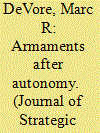

|
|
|
|
|
| Summary/Abstract |
State investments in domestic defence industries are one of the most puzzling trends in international relations. Economists contend that these investments waste resources, while political scientists claim that armaments’ resultant overproduction fuels arms races. Why then do governments cultivate defence industries? I draw on cases from Israel, South Africa and Iraq to argue that the answers to these questions are distinct. Fears about supply security frequently spur states to begin developing arms industries, and elites’ techno-nationalist beliefs often sustain their defence-industrial investments. Defence industries’ primary national security value, however, lies in their hitherto unappreciated contribution to states’ military adaptation capacity.
|
|
|
|
|
|
|
|
|
|
|
|
|
|
|
|
| 2 |
ID:
111457
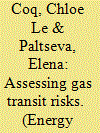

|
|
|
|
|
| Publication |
2012.
|
| Summary/Abstract |
This paper proposes a Transit Risk Index (TRI) designed to assess the riskiness of pipeline gas imports and to study the effect of introducing new gas routes. TRI controls for gas dependency, transit route diversification, political risks of transit, pipeline rupture probability, and the balance of power between supplying and consuming countries along the transit route. Evaluating TRI for the EU-Russia gas trade, we show that the introduction of the Nord Stream pipeline would further widen already large disparities in gas risk exposure across the EU Member States. The gas risk exposure of the Member States served by Nord Stream would decline. In contrast, EU countries not connected to Nord Stream, but sharing other Russian gas transit routes with the Nord Stream countries, would face greater gas risk exposure. We discuss the implications of our analysis for the design of the common energy policy in the EU.
|
|
|
|
|
|
|
|
|
|
|
|
|
|
|
|
| 3 |
ID:
099331


|
|
|
|
|
| Publication |
2010.
|
| Summary/Abstract |
Throughout the history of the electricity industry, regulatory reform has been driven by the pursuit of tools able to create conditions that would favour infrastructure investment and, generally, to surmount the obstacles that hinder system expansion. This article addresses the interaction between regulatory schemes and electric power generation investment, with a review of the changing role of the State in the expansion of electricity supply in Latin America. It contains a critical assessment of changes in the regulatory framework since the outset of electric power market reform, describing the successive approaches to regulation adopted in the last three decades. The aim of this analysis is to help identify the key factors underlying the evolution of energy policies and to contribute to the formulation of a prospective view of the direction this evolution may reasonably be expected to take.
|
|
|
|
|
|
|
|
|
|
|
|
|
|
|
|
| 4 |
ID:
113427
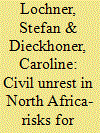

|
|
|
|
|
| Publication |
2012.
|
| Summary/Abstract |
The uprising and military confrontation in Libya that began in February 2011 has led to disruptions of gas supplies to Europe. An analysis of how Europe has compensated for these missing gas volumes shows that this situation has not affected security of supply. However, this situation would change if the North African uprising were to spread to Algeria. Since Algeria is a much more important gas supplier to Europe than is Libya, more severe consequences would be likely. Applying a natural gas infrastructure model, we investigate the impact of supplier disruptions from both countries for a summer and winter period. Our analysis shows that disruptions in the low-demand summer months could be compensated for, mainly by LNG imports into several European countries. An investigation of a similar situation at the beginning of the winter shows that security of supply would be severely compromised and that disruptions to Italian consumers would be unavoidable. The analysis thereby highlights the importance of taking the political stability of supply countries into account when assessing the security of European gas imports.
|
|
|
|
|
|
|
|
|
|
|
|
|
|
|
|
| 5 |
ID:
166719
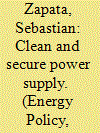

|
|
|
|
|
| Summary/Abstract |
Across the world, the electricity industry is changing with the advent of renewable energy sources such as solar and wind power. As these are exposed to intermittency, seasonality, and global-climate-variation, policy-makers' concerns are now shifting towards security of supply. In fact, the industry confronts three conflicting goals: security of supply, competitive prices to customers, and environmental protection. In this context, and given the multiple uncertainties of technology transformation, this paper uses modelling-based scenario analysis to investigate different extreme and plausible futures. Simulation is used to analyse policies aimed at increasing the penetration of renewables and to explore how these energy sources may affect system reliability. This paper explores the effect of incorporating renewables in Colombia, where a large hydroelectric component has led to insufficient electricity being available during droughts and to high electricity price volatility. Though not intuitive at first glance, this paper shows that renewables may contribute to: i) increased security of supply through complementarity, e.g., it does not rain when the sun shines; ii) reduced price volatility in the medium-term, and iii) increased industry sustainability.
|
|
|
|
|
|
|
|
|
|
|
|
|
|
|
|
| 6 |
ID:
109695


|
|
|
|
|
| Publication |
2011.
|
| Summary/Abstract |
The quest for renewable energy sources has been strong in Spain for a couple of decades, and has produced outstanding results, notably in windpower. Solar technologies also had a prompt response to the promoting legislation of 2007. This evolution has generated side effects in the electricity generation system as a whole, and all this phenomenology is analysed in this paper under the consideration of the three objectives theoretically guiding electricity policy nowadays: security of supply (at macro and micro level), environmental quality, and economic competitiveness. The analysis points out some unbalance among the objectives, which can evolve to a scenario where back-up power is going to be a critical point for the stability of the system. Such a back-up service will surely be provided by gas-fired combined cycles (GFCC). The estimated projections of the generation system show that the required back-up power will grow about 8-9 GW by year 2020, for complying with the objective of attaining a share of 40% renewable electricity. However, collateral effects as the decline in the load factor of GFCC, as well as a reduction in spot price of electricity, can cast many doubts about the feasibility to reach that back-up power level.
|
|
|
|
|
|
|
|
|
|
|
|
|
|
|
|
| 7 |
ID:
117290
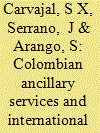

|
|
|
|
|
| Publication |
2013.
|
| Summary/Abstract |
Ancillary services are required to maintain the unity, stability, and quality of power systems. In Colombia these services are required to operate the national power system and the international connections with the neighboring countries. The system is influenced by factors ranging from system's topology to social and political aspects, such as the large number of terrorist attacks. In light of these particularities, we consider Colombia as a learning lab for ancillary services in the region. Colombia's power system relies on three ancillary services for its operation, namely frequency regulation, voltage control, and blackstart service. From 2010 Special Protection Systems were also added. In this paper we first analyze the technical aspects, operational restrictions, financial management, and the most relevant regulatory conditions of these ancillary services of the SIN. We also take into consideration the main regulatory characteristics and statistical data related to energy exchanges that have taken place between Colombia and Venezuela and Ecuador. Thereafter, we depict the main weaknesses and policy challenges that Colombia must address in order to increase the effectiveness and coverage of ancillary services in both the SIN and in the international interconnections. Finally, we propose new market oriented regulations to encourage investments and new tools for international connections.
|
|
|
|
|
|
|
|
|
|
|
|
|
|
|
|
| 8 |
ID:
136254
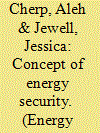

|
|
|
|
|
| Summary/Abstract |
Energy security studies have expanded from their classic beginnings following the 1970s oil crises to encompass various energy sectors and increasingly diverse issues. This viewpoint contributes to the re-examination of the meaning of energy security that has accompanied this expansion. Our starting point is that energy security is an instance of security in general and thus any concept of it should address three questions: “Security for whom?”, “Security for which values?” and “Security from what threats?” We examine an influential approach – the ‘four As of energy security’ (availability, accessibility, affordability, and acceptability) and related literature of energy security – to show it does not address these questions. We subsequently summarize recent insights which propose a different concept of energy security as ‘low vulnerability of vital energy systems’. This approach opens the road for detailed exploration of vulnerabilities as a combination of exposure to risks and resilience and of the links between vital energy systems and critical social functions. The examination of energy security framed by this concept involves several scientific disciplines and provides a useful platform for scholarly analysis and policy learning.
|
|
|
|
|
|
|
|
|
|
|
|
|
|
|
|
| 9 |
ID:
112886


|
|
|
|
|
| Publication |
2012.
|
| Summary/Abstract |
Energy security1 is one of the main targets of energy policy. However, the term has not been clearly defined, which makes it hard to measure and difficult to balance against other policy objectives.
We review the multitude of definitions of energy security. They can be characterized according to the sources of risk, the scope of the impacts, and the severity filters in the form of the speed, size, sustention, spread, singularity and sureness of impacts. Using a stylized case study for three European countries, we illustrate how the selection of conceptual boundaries along these dimensions determines the outcome. This can be avoided by more clearly separating between security of supply and other policy objectives. This leads us to the definition of energy security as the continuity of energy supplies relative to demand.
|
|
|
|
|
|
|
|
|
|
|
|
|
|
|
|
| 10 |
ID:
112897


|
|
|
|
|
| Publication |
2012.
|
| Summary/Abstract |
This paper investigates the economic implications of disruptions of one to ninety days to the supply of natural gas in Ireland. We assess the impact of a hypothetical gas supply disruption in both winter and summer in 2008 (with observed market characteristics) and in 2020 (with projected market characteristics). The cost of a natural gas outage includes the cost of natural gas being unavailable for heating and other purposes in the industrial and commercial sectors, lost consumer surplus in the residential sector, the cost of lost electricity in all sectors and lost VAT on the sale of gas and electricity. Ireland generates much of its electricity from natural gas and the loss of this electricity accounts for the majority of the cost of a natural gas outage. Losing gas-fired electricity would cost 0.1-1.0 billion euro per day, depending on the time to the week, the time of year and rationing. Industry should be rationed before households to minimise economic losses, but current emergency protocols do the opposite. If gas-fired electricity is unavailable for three months, the economic loss could be up to 80 billion euro, about half of Gross Domestic Product. Losing gas for heating too would add up to approximately 8 billion euro in economic losses. We also discuss some options to increase Ireland's security of supply, and find that the cost is a small fraction of the avoided maximum damage.
|
|
|
|
|
|
|
|
|
|
|
|
|
|
|
|
| 11 |
ID:
099340


|
|
|
|
|
| Publication |
2010.
|
| Summary/Abstract |
Since the very beginning of the power systems reform process, one of the key questions posed has been whether the market, of its own accord, is able to provide satisfactory security of supply at the power generation level or if some additional regulatory mechanism needs to be introduced, and in the latter case, which is the most suitable approach to tackle the problem. This matter is undoubtedly gaining importance and it has taken a key role in the energy regulators' agendas.
In this paper, we critically review and categorize the different approaches regulators can opt for to deal with the problem of guaranteeing (or at least enhancing) security of supply in a market-oriented environment. We analyze the most relevant regulatory design elements throughout an updated assessment of the broad range of international experiences, highlighting the lessons we have learned so far in a variety of contexts. Based on the analysis, we conclude by providing a set of principles and criteria that should be considered by the regulator when designing a security of supply mechanism.
|
|
|
|
|
|
|
|
|
|
|
|
|
|
|
|
| 12 |
ID:
150017


|
|
|
|
|
| Summary/Abstract |
Regulation (EU) No 994/2010 concerning measures to safeguard security of gas supply was adopted following the 2009 commercial dispute between Ukraine and Russia which yield to a gas disruption. Since then, new infrastructure and cooperation measures have being implemented in order to reinforce the European gas system to better cope with gas shortages. Joint Research Centre has developed GEMFLOW, a country-based model of the European gas network, to simulate gas disruptions of different duration and to estimate the survival time and gas non-served per country. In this paper an analysis and comparison of the improvements carried out in the European gas system between 2009 and 2014 is presented and GEMFLOW model is used to evaluate the progress being made to strengthen the security of gas supply at European level.
|
|
|
|
|
|
|
|
|
|
|
|
|
|
|
|
| 13 |
ID:
110441


|
|
|
|
|
| Publication |
2011.
|
| Summary/Abstract |
The energy security conundrum - how to equitably provide available, affordable, reliable, efficient, and environmentally benign energy services - is a technology and policy challenge, perhaps unlike any other. The recent article on an energy security in the Asia Pacific by Vlado Vivoda is an excellent starting point for how to best capture the unique energy security challenges facing the region. This article builds on Vivoda's work, but also points out some shortcomings with his analysis.
|
|
|
|
|
|
|
|
|
|
|
|
|
|
|
|
| 14 |
ID:
150896


|
|
|
|
|
| Summary/Abstract |
Liberalisation and the ever larger share of variable renewable energies (VRES), e.g. photovoltaic (PV) and wind energy, affect security of supply (SoS). We develop a system dynamics model to analyse the impact of VRES on the investment decision process and to understand how SoS is affected. We focus on the Swiss electricity market, which is currently undergoing a liberalisation process, and simultaneously faces the encouragement of VRES and a nuclear phase out. Our results show that nuclear production is replaced mainly by PV and imports; the country becomes a net importer. This evolution points to a problem of capacity adequacy. The resulting price rise, together with the subsidies needed to support VRES, lead to a rise in tariffs. In the presence of a high share of hydro, the de-rated margin may give a misleading picture of the capacity adequacy. We thus propose a new metric, the annual energy margin, which considers the energy available from all sources, while acknowledging that hydro-storage can function as a battery. This measure shows a much less reassuring picture of the country’s capacity adequacy.
|
|
|
|
|
|
|
|
|
|
|
|
|
|
|
|
| 15 |
ID:
090057
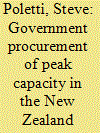

|
|
|
|
|
| Publication |
2009.
|
| Summary/Abstract |
This paper analyzes the impact of government procurement of reserve electricity generation capacity on the long-run equilibrium in the electricity market. The approach here is to model the electricity market in a context where the supply companies have market power. The model is then used to analyze the impact of government direct supply of peak capacity on the market. We find that the firms build less peak-generation capacity when the government procures peak generating capacity. The long-run equilibrium with N firms and government capacity of KG results in an increase of total peak generation capacity of KG/(N+1) compared to the long-run equilibrium with no government capacity. Supply disruptions of baseline capacity during the peak time period are also considered. It is found that peak prices do not go up any further with (anticipated) supply disruptions. Instead the entire cost of the extra peakers is borne by customers on traditional meters and off-peak customers who face real-time pricing.
|
|
|
|
|
|
|
|
|
|
|
|
|
|
|
|
| 16 |
ID:
103385


|
|
|
|
|
| Publication |
2011.
|
| Summary/Abstract |
This article explores the concept of energy security perceived and understood by a sample of government, business, civil society, and university stakeholders in India. Based on a literature review, the authors hypothesize what energy experts suggest energy security is for India. The article then tests these hypotheses through the use of a survey completed by 172 Indian respondents. The article begins by describing its methodology before summarizing the results of the literature review to distill seven working hypotheses related to energy security in India. These hypotheses relate to (1) security of energy supply, (2) equitable access to energy services, (3) research and development of new energy technologies, (4) energy efficiency and conservation, (5) self-sufficiency and trade in energy fuels, (6) nuclear power, and (7) the energy-water nexus. It then tests these hypotheses with our survey instrument before concluding with implications for energy policy in India and beyond.
|
|
|
|
|
|
|
|
|
|
|
|
|
|
|
|
| 17 |
ID:
088215
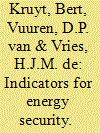

|
|
|
|
|
| Publication |
2009.
|
| Summary/Abstract |
The concept of energy security is widely used, yet there is no consensus on its precise interpretation. In this research, we have provided an overview of available indicators for long-term security of supply (SOS). We distinguished four dimensions of energy security that relate to the availability, accessibility, affordability and acceptability of energy and classified indicators for energy security according to this taxonomy. There is no one ideal indicator, as the notion of energy security is highly context dependent. Rather, applying multiple indicators leads to a broader understanding. Incorporating these indicators in model-based scenario analysis showed accelerated depletion of currently known fossil resources due to increasing global demand. Coupled with increasing spatial discrepancy between consumption and production, international trade in energy carriers is projected to have increased by 142% in 2050 compared to 2008. Oil production is projected to become increasingly concentrated in a few countries up to 2030, after which production from other regions diversifies the market. Under stringent climate policies, this diversification may not occur due to reduced demand for oil. Possible benefits of climate policy include increased fuel diversity and slower depletion of fossil resources.
|
|
|
|
|
|
|
|
|
|
|
|
|
|
|
|
| 18 |
ID:
093488


|
|
|
|
|
| Publication |
2010.
|
| Summary/Abstract |
Natural gas has become an increasingly valuable resource and a global commodity. The demand for it has significantly increased. Japan, Korea and Taiwan heavily rely on liquefied natural gas (LNG) imports for their gas supplies from Malaysia, Brunei, Indonesia, Australia and the Middle East. On the other hand, countries like Thailand and Singapore import gas via trans-border pipelines. Gas supply interruptions, volatile gas prices, transportation and distribution bottlenecks, and a growing reliance on imports over longer distances have renewed interest on gas security in Asia. This paper examines the relative vulnerability to natural gas supply disruptions of seven gas-importing countries in Asia for year 2008. Based on four indicators of security of gas supply, a composite gas supply security index is estimated as an overall indication of gas vulnerability for our sample countries. The results demonstrate that there are differences in the values of the overall indicator of gas vulnerability among countries and the assessment is useful in developing an effective strategy of natural gas supply security in countries in the Asian region.
|
|
|
|
|
|
|
|
|
|
|
|
|
|
|
|
| 19 |
ID:
065302


|
|
|
| 20 |
ID:
092615
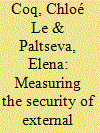

|
|
|
|
|
| Publication |
2009.
|
| Summary/Abstract |
The security of energy supply is one of the main objectives of EU energy policy. In this paper, we introduce an index designed to evaluate the short-term risks associated with the external supply of energy to the EU Member States. It combines measures of energy import diversification, political risks of the supplying country, risk associated with energy transit, and the economic impact of a supply disruption. We construct separate indexes for three primary energy types, oil, gas and coal, and demonstrate that Member States' levels of supply risk exposure differ across energies. Most other studies of this kind provide aggregate indexes combining different types of energy. Our results suggest that an aggregate approach could be misleading, at least for discussions of the short-term response to risks. We discuss the implications of our findings for the common energy policy.
|
|
|
|
|
|
|
|
|
|
|
|
|
|
|
|
|
|
|
|
|